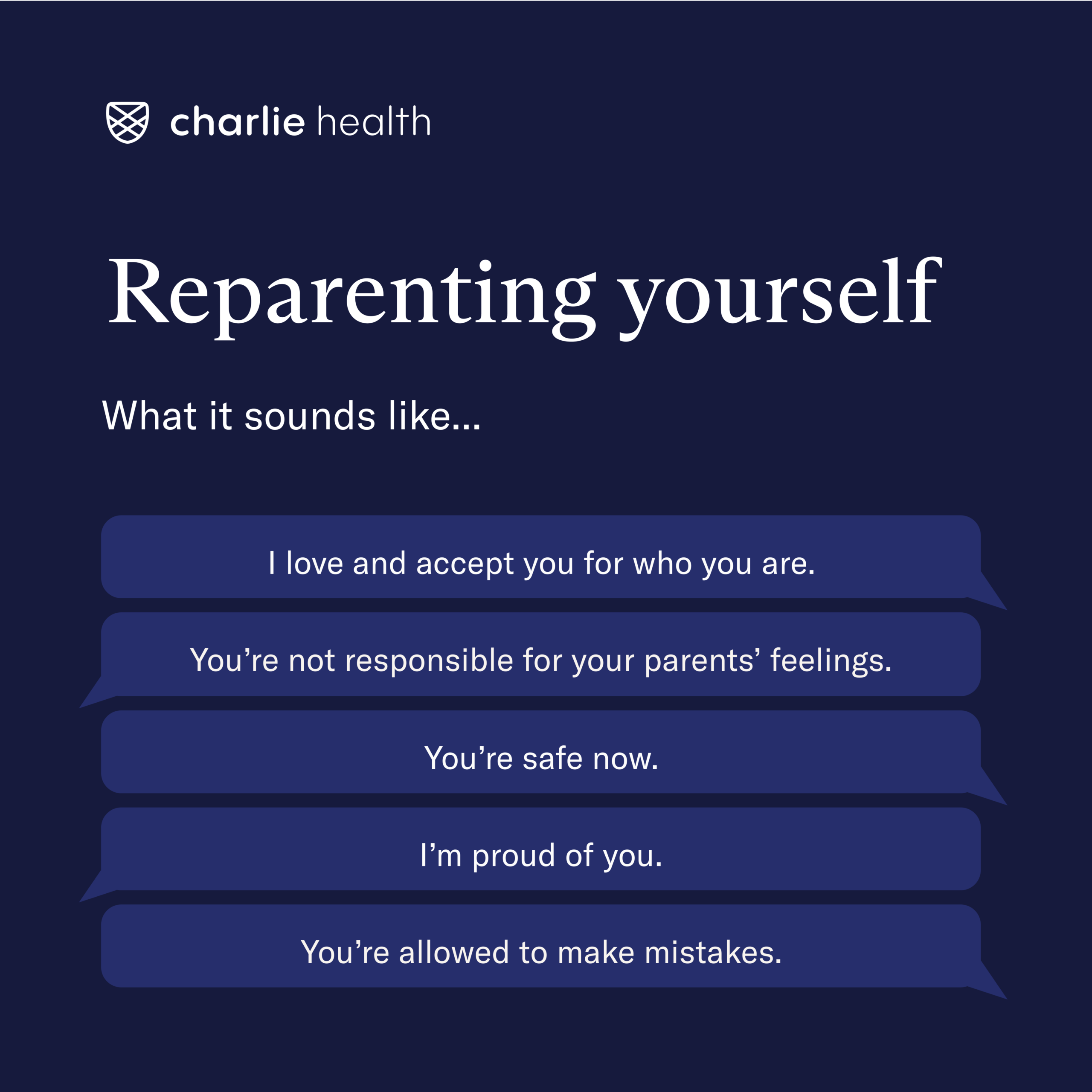
Table of Contents
What to Do as the Adult Child of Emotionally Immature Parents

Written By: Alex Bachert, MPH

Clinically Reviewed By: Sarah Lyter
August 14, 2024
6 min.
Growing up with emotionally immature parents can influence your attachment style and cause other emotional concerns later in life. Learn how to heal your relationship with yourself and your parents as an adult child.
Learn more about our Clinical Review Process
Table of Contents
As children, we’re taught to rely on our parents and caregivers for support, comfort, and protection. However, as people grow older, they may realize that their parents weren’t always able to validate their feelings or provide emotional stability (as is expected of a mature parent). In these situations, they may have what’s known as an emotionally immature parent. Below, we delve into how emotionally immature parenting affects your adult life and how to heal your relationship with yourself and your parents as an adult child.

Emotionally immature parenting takes a toll on your mental health
Get the support you need to manage your emotional needs as an adult.
What is an emotionally immature parent?
Emotional immaturity is defined as “a tendency to express emotions without restraint or disproportionately to the situation,” according to the American Psychological Association. There are many kinds of emotionally immature people, but parents who are emotionally immature often struggle to recognize and regulate their own emotional states, which can influence how they’re able to support their children’s emotional needs.
Having an emotionally immature parent isn’t the same as having one who is emotionally abusive, but it can increase a person’s chances of childhood trauma. “Some people may find growing up with emotionally immature parents to be traumatic,” says Sarah Lyter, LPC, Senior Primary Therapist with Charlie Health. “This would likely be considered a relational trauma rather than acute trauma. Relational trauma is trauma that occurs through continued, repeated experiences that can disrupt our sense of safety, attachment, and stability.”
Signs of an emotionally immature parent
Emotionally immature parenting isn’t always obvious at the moment, but as an adult, you may be able to reflect on clear instances of emotional immaturity or emotional neglect. Some research suggests that there are four types of emotionally immature parents:
- The emotional parent: These parents tend to have unpredictable and impulsive reactions. They often have poor communication skills and low levels of empathy, which can cause anxiety and instability for their children.
- The driven parent: These parents are so focused on their own opinions and desires that they don’t help their children explore their own goals. They struggle to provide empathy and comfort, and their children are often shamed for not sharing the same motives in life.
- The passive parent: These parents are self-involved and self-centered, which leaves their children feeling passive and directionless in their own lives. While passive parents can be empathetic at times, they’re not always protective and tend to avoid difficult situations.
- The rejecting parent: These parents take a “hands-off” approach to parenting, especially when it comes to feelings and emotions. Their children soon learn that they won’t receive affection, comfort, or compassion from their parents.
Other signs that your parents might be emotionally immature include:
- High emotional reactivity, such as extreme emotional outbursts or unpredictable emotional responses
- Refusal to apologize or take accountability for their mistakes
- Dismissive of other people’s feelings
- Trouble with healthy and consistent boundaries
How emotionally immature parents affect your adult life
Having emotionally immature parents “can create a variety of emotional and psychological effects, including trouble regulating emotions, because this likely wasn’t modeled by parents growing up,” explains Lyter. “There’s more likelihood for increased stress, as well as increased anxiety, and struggles regulating sleep and eating.”
According to Lyter, not receiving emotional support as a child can cause a range of problems later in life for an adult child of emotionally immature parents, including:
- Low self-esteem
- Fear of abandonment
- Conflict avoidance
- People-pleasing behaviors
- Perfectionism
- Poor communication skills
- Trust issues
- Trouble setting boundaries
Importantly, growing up with emotionally immature parents can influence your attachment style later in life. “According to John Bowlby’s attachment theory, our attachment style is directly related to how we are treated by and attended to by parents during childhood,” says Lyter. “Because of inconsistent emotional availability, potential emotional neglect, the likelihood for unpredictability and chaos, and lack of emotional support, children of emotionally immature parents are more likely to have anxious, avoidant, or disorganized attachment styles,” she explains.

Is it possible to change your relationship with your parents?
Now that you’re an adult, you may be wondering if it’s possible to improve your connection with your parents. According to Lyter, attempting to challenge or change your relationship with your parents as an adult can be challenging because most families have patterns and dynamics that are deeply ingrained, making it tough to address and chance unhealthy dynamics.

“If parents continue to be emotionally immature people, they may not be capable of assuming accountability for their actions and may have minimal motivation to change,” explains Lyter. “There are likely unresolved issues and emotions that can create more complexity, and there may be issues in boundaries, communication, and emotional expression,” she adds.
But while it may not be easy, it’s certainly possible to heal your relationship with emotionally immature parents as an adult. Here are three tips:
1. Manage your expectations
“Recognizing that your parents’ potential for change may not be what you hope will be helpful,” says Lyter. Instead, focus on what you can control within the relationship, such as setting clear and consistent boundaries and engaging in healthy communication patterns.
2. Use your coping skills
Lyter encourages people to “take care of yourself with your own therapy, self-care practices, and leaning on your support system.”
3. Be mindful of your feelings and attitudes
If your parents lack emotional maturity, you may have lingering feelings of resentment or pain. “Try to foster empathy, understanding, and compassion for your parents,” Lyter suggests. “You can also try to focus on finding common ground in shared interests and activities and highlighting positives.”
Four tips for emotional healing
If you grew up with an emotionally immature or unavailable parent, it’s important to find ways to prioritize your emotional well-being and growth. Here are four tips for improving your self-esteem, emotional intelligence, and interpersonal relationships.
1. Practice self-care
Self-care techniques like physical activity, meditation, and relaxation exercises can help people manage stress and improve emotional well-being.
2. Heal your inner child
By reparenting your inner child, you have a chance to offer yourself the compassion, comfort, and reassurance that you might not have received during your childhood.
3. Confide in someone you trust
Having access to a support system of trusted family and friends can help provide clarity, improve resiliency, and enhance overall well-being.
4. Consider therapy
For many people, therapy is an effective tool for understanding the impact of emotionally immature parents. Talk therapy can help you make sense of your experiences, validate your feelings, and develop coping strategies for distressing situations.

How Charlie Health can help
If your parents struggled with emotional intimacy or failed to meet your emotional needs, you may be looking for advice on how to manage your emotional well-being as an adult. Charlie Health’s virtual Intensive Outpatient Program (IOP) provides more than once-weekly mental health treatment for people dealing with a range of issues, including emotional neglect and intergenerational trauma. Our expert clinicians incorporate evidence-based therapies into individual counseling, family therapy, and group sessions. With treatment, managing your well-being is possible. Fill out the form below or give us a call to start healing today.




